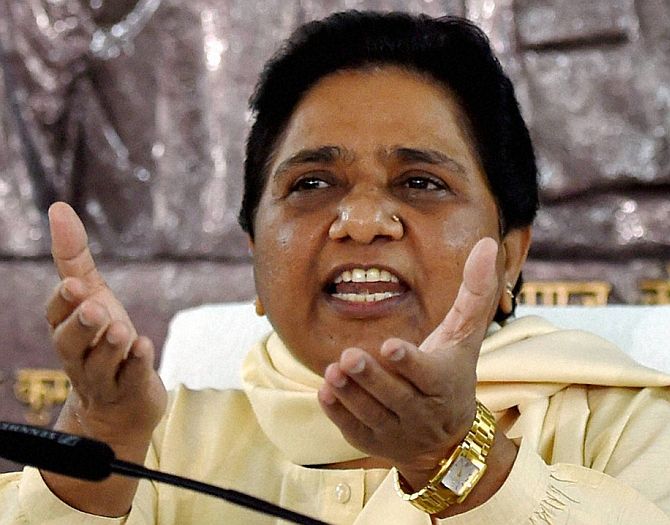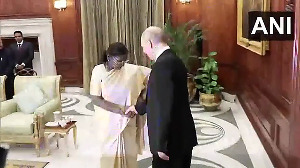What's the logic behind the BJP targeting Mayawati's votes?
Sahil Makkar and Mayank Mishra explain.

Bharatiya Janata Party President Amit Shah's decision to take a holy dip and break bread with Dalits appears part of a considered strategy in the run-up to next year's Uttar Pradesh elections.
A section in the BJP believes if they continue to get support from estranged ex-supporters of the Bahujan Samaj Party, and if the newly appointed state unit president, Keshav Prasad Maurya, manages to draw support from his backward community, they have a fair chance in 2017.
Their confidence stems from, for instance, poll data from the Centre for the Study of Developing Societies. This suggests the BSP's loss among Dalits was the BJP's gain in the 2014 Lok Sabha elections in the state.
It says nearly 18 per cent of the Jatavs, considered core BSP voters, and an impressive 45 per cent of other Dalits, voted for the BJP or its allies.
This resulted in the BSP suffering a massive erosion in its core vote banks for the first time since the party was formed in 1984.
The BSP lost eight percentage points from its vote share of the 2009 general election, whereas the BJP recorded a huge jump of 25 percentage points (including 11 per cent from the Congress and three per cent from the Rashtriya Lok Dal).
However, the Samajwadi Party's vote share remained almost the same.
Currently, the Samajwadi Party rules the UP assembly and the BSP is the principal Opposition party.
The BJP, which is third, wants to break the hegemony of both parties, ruling the state between themselves with an absolute majority for the past decade.
In the past, the BJP had formed a government twice with the BSP.
The BJP only got a full majority at the height of the Ram Janmabhoomi movement in 1991, but its government was dismissed with the demolition of the Babri Masjid on December 6, 1992.
The BJP now wants to again ride the pro-Hindutva wave that swept the state in the 2014 general election, winning 71 of the state's 80 seats.
The party is depending on its core voters (upper caste), estranged voters (Dalit) of Mayawati and those who voted for the Congress in the past.
It is likely the BJP will retain its core voter and those who defected to it from the Congress in the Lok Sabha election.
Since the Samajwadi Party voters (Yadav and other backward classes) are unlikely to change their loyalties, the BJP's best bet would be to target the BSP's eroding vote bank.
The BSP's Jatav vote bank had come down to 62 per cent, from 86 per cent in the 2012 assembly election.
Worse, a majority of Valmikis, another influential Dalit group in UP, voted for non-BSP parties in the 2012 election, as opposed to 71 per cent of them voting for the BSP five years earlier.
As a result of the massive slide in its Dalit base, the BSP could win only 15 seats out of 85 reserved for scheduled castes in 2012. The Samajwadi Party, on the other hand, did exceedingly well by winning 58 of these.
In fact, the Samajwadi Party's vote share in reserved seats was more than its average vote share in the state. It is quite a change from the situation in 2007. The BSP had then won 61 reserved seats and the Samajwadi Party a mere 13 of these.
Experts say there is a reason why the BJP is downplaying the importance of the BSP by saying it has a direct fight with the SP in Uttar Pradesh.
If the perception gains ground, there is likely to be depletion of the BSP's support among Dalits, who might vote for the BJP. The others, including Kurmis, Lodhs and Mauryas are also expected to vote for the BJP in the given situation.
"A bi-polar contest suits the BJP, which is why it is saying that it has a direct fight with the SP. The BJP used to have a small core base in UP, not more than 14 to 15 per cent. It is not enough to decisively impact elections. It is working on expanding its core by targeting Dalits," observes Lucknow-based political analyst Sudhir Panwar.
Traditionally, parties getting 30 per cent of the votes have formed a government with a full majority in the state. The Samajwadi Party in 2012 and the BSP in 2007 got 30 per cent of all votes.
The BJP's incessant attempts to woo Dalits have been noticed among the top BSP echelons. At a closed door meeting last week, Mayawati is learnt to have told her lieutenants to campaign intensively among their core vote bank.
As a counter strategy, though, she has apparently decided to nominate nearly 100 Brahmin candidates. Panwar said she had employed the same tactics in the past and this did not go down well with the core constituency of Dalits.
"The BSP has been consistently fielding one-fourth Brahmin candidates, which might have alienated a section of Dalits," he said.
And now the exit of the BSP's backward caste face, Swami Prasad Maurya, is likely to impact its prospects more.
The BJP's UP campaign: Some Facts
- In 2014, the BJP won 73 of UP's 80 seats, a tally that powered its overall tally to over 280 seats in the Lok Sabha. The BJP's best performance in UP previously was in 1998: 57 out of 85 seats (since Uttarakhand was yet to be carved out of it).
- The party fielded 25 members of other backward classes or OBC and 17 from the scheduled castes, balanced that with 16 Brahmin candidates and 14 Rajputs. It allied with the Apna Dal, a party of Kurmis, an influential backward caste, giving it two seats.
- In the 2017 assembly election, it is likely to make law and order and land reclamation its important campaign points. Anecdotal evidence suggests large tracts of public land has been occupied by goons, in connivance with the lower bureaucracy. The best example was the recent events in Mathura. The campaign is that BJP workers must highlight this mutually beneficial arrangement between caste leaders and political/government functionaries.
- But many in the BJP say the weakest link in its campaign is its stubborn refusal to name a candidate as its chief minister. This will deter it from capitalising on the 'politics of hope' that brought Narendra Modi's government to power.











